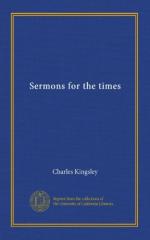And yet, in names there is a lower depth still among fallen and heathen men; when they lose utterly the last dim notion that God intends men to be persons, even as God the Father is a person, and God the Son a person, and God the Holy Spirit is a person, and so lose the custom of giving their children personal names at all; either giving them, after they grow up, mere nicknames, taken from some peculiarity of their bodies, or something which they have done, or some place where they happen to live; or else, like many tribes of heathen negroes, just name them after the day of the week on which they were born, as some way of knowing them apart; or, last and most shocking of all, give them no names at all, and have no names themselves, knowing each other apart as the dumb animals do, only by sight. I can conceive no deeper fall into utter brutishness than that; and yet some few of the most savage tribes, both in Africa and in the Indian islands, are said—God help them!—to live in that way, and to have no names;—blotted, indeed, out of the book of life!
But is this the right state for men? No; it is the wrong state. It is a disease into which men are fallen; a disease out of which Christ came to raise men; and out of which He does raise us in Holy Baptism. Baptism puts the child into its right state—into the right state for a human being, a human soul, a human person. And baptism declares what that right state is—a member of Christ, a child of God, and an inheritor of the kingdom of heaven. A member of Christ, and therefore a person, because Christ is a person. A child of God, and therefore a person, because a child’s duty is to love and trust and obey his father—and only a person can do that, not an animal or a thing. An inheritor of the kingdom of heaven, and therefore bound to cherish all heavenly thoughts and feelings, all righteousness, love, and obedience, which only spirits and persons, not animals or things, can feel.




